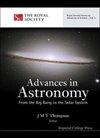基于等效输入干扰法的射电望远镜伺服系统的跟踪和干扰抑制
IF 1.2
4区 物理与天体物理
Q3 ASTRONOMY & ASTROPHYSICS
引用次数: 0
摘要
本文针对射电望远镜伺服控制系统提出了一种复合控制算法,以解决目标跟踪和匹配/不匹配干扰抑制问题。该算法由等效输入干扰(EID)方法和最优控制方法组成。利用状态观测器的估计输出与测量输出之间的差值开发了一个 EID 估计器,然后将 EID 估计值前馈到控制输入中以抑制干扰。选择具有明确物理意义的成本函数,并调整最优控制器的加权参数,以提高跟踪性能。考虑到射电望远镜系统的非最小相位特性,采用线性矩阵不等式(LMI)方法计算状态观测器增益。利用小增益定理分析系统稳定性,并利用线性二次调节器(LQR)控制方法确定状态反馈增益。最后,针对确定的望远镜模型设计了复合控制器。仿真结果表明,在跟踪性能方面,拟议方法的沉降时间为 1.13 秒,比 ADRC 控制器和 PI 控制器分别缩短了约 0.32 秒和 0.87 秒。在抗干扰性能方面,所提方法的均方根值和最大误差分别为 0.0039 和 0.0128,分别是 ADRC 控制器的 42.86% 和 40.38%,PI 控制器的 30.71% 和 27.77%,这表明所提方法具有更好的控制性能。此外,提出的控制器对系统参数扰动具有一定的鲁棒性。本文章由计算机程序翻译,如有差异,请以英文原文为准。
Tracking and Disturbance Suppression of the Radio Telescope Servo System Based on the Equivalent-Input-Disturbance Approach
This paper presents a composite control algorithm for the radio telescope servo control system to address the target tracking and matched/mismatched disturbance suppression problems. The algorithm consists of the equivalent-input-disturbance (EID) approach and the optimal control method. An EID estimator is developed using the difference between the estimated output of the state observer and the measurement output and then the estimate of the EID is fed forward into the control input to reject the disturbance. A cost function with clear physical meaning is selected and the weighting parameters are adjusted for the optimal controller to improve tracking performance. Considering the nonminimum phase characteristics of the radio telescope system, the state observer gain is computed using the linear matrix inequality (LMI) method. The system stability is analyzed using the small gain theorem, and the linear quadratic regulator (LQR) control method is utilized to determine the state feedback gain. Finally, the composite controller is designed for an identified telescope model. Simulation results show that for the tracking performance, the settling time of proposed method is 1.13 s and reduces by about 0.32 s and 0.87 s than that of the ADRC controller and PI controller, respectively. For the antidisturbance performance, the RMS value and the maximum error of the proposed method are 0.0039 and 0.0128, which are 42.86% and 40.38% of the ADRC controller and 30.71% and 27.77% of the PI controller, respectively, which indicates that the proposed method has better control performance. In addition, the proposed controller has certain robustness to systematic parameter perturbations.
求助全文
通过发布文献求助,成功后即可免费获取论文全文。
去求助
来源期刊

Advances in Astronomy
ASTRONOMY & ASTROPHYSICS-
CiteScore
2.70
自引率
7.10%
发文量
10
审稿时长
22 weeks
期刊介绍:
Advances in Astronomy publishes articles in all areas of astronomy, astrophysics, and cosmology. The journal accepts both observational and theoretical investigations into celestial objects and the wider universe, as well as the reports of new methods and instrumentation for their study.
 求助内容:
求助内容: 应助结果提醒方式:
应助结果提醒方式:


